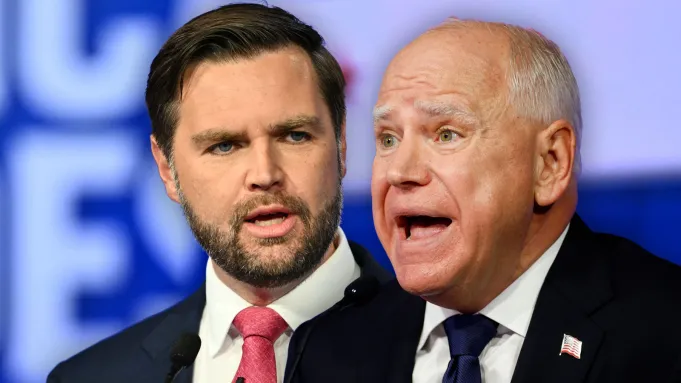During a high-energy vice-presidential debate Tuesday, the Republican opponent Sen. Ohio Sen. JD Vance and the Democratic frontrunner Gov. Minnesota’s Tim Walz argued over central policy points such as foreign policy, border security, abortion and climate change. The debate in New York City – moderated by the CBS News anchors Norah O’Donnell and Margaret Brennan – gave the two candidates a chance to show us their ideas just five weeks before the election on Nov. 5.
Though more generally seen as less crucial than presidential debates, this event was special because no other debate between former president Donald Trump and Vice President Kamala Harris took place. During a time when the American voters are dealing with major national and international issues, the vice-presidential candidates had to step up and present not only their qualifications, but those of their running mates. The tense environment around the debate was intense, when nearly 50,000 dockworkers had been murdered from Maine to Texas and Iran carried out the largest missile strike against Israel in history.
Foreign Policy and Iran”
The night’s highlight was when the candidates were pressed to decide whether they would endorse an Israeli strike on Iran. Walz, who looked visibly shaken early in the debate, did not directly respond to the question and instead attacked Trump’s leadership. He referred to Trump’s performance in his last debate with Harris: Trump’s obsession with “crowd sizes” signaled America’s lack of leadership today.
Vance, on the other hand, upheld Trump’s foreign policy legacy and said “peace through strength” was what made Trump succeed at global stability. Vance went on to repeat that Trump’s administration kept the world on side with deterrence and Israel would respond with a surprise attack if needed by Israeli leadership.
Vance lambasted Trump’s administration for exiting the Iran Nuclear Deal, but blamed the Biden-Harris administration for not controlling events over the past three and a half years: “You fault Donald Trump, but who was the vice president over the past 312 years?” Vance responded to Walz by pointing out Harris’ central position in the current administration’s foreign policy choices.
Border Security
On border security, Vance and Walz presented different visions. Vance charged that Harris who was given the task of enforcing border security was under performing her duties as “border czar.” Vance asserted he had visited the border more times than Harris and promoted Trump’s plan for enforcing the southern border.
Walz, meanwhile, accused Trump of working on legislation to delay a comprehensive border security bill, saying that he framed immigration as a campaign matter rather than a problem: “What would Donald Trump say if we did some of these things?” Walz wrote, suggesting that Trump’s policies were less about governance and more about political discourse.
There was a standout on the matter when moderators asked Vance whether or not he and Trump were in favor of separations for family as part of Trump’s planned “mass deportation.” Vance transitioned to the humanitarian crisis at the border and accused the Biden-Harris administration of forgetting 320,000 children who had, he alleged, been sexually trafficked or turned into drug mules. Walz resisted, citing Harris’s track record as California’s attorney general in bringing cases against human trafficking.
Abortion
The abortion issue remained central to the controversy, as was national discourse. Walz reiterated his and Harris’s pro-choice stance, but Vance did something more subtle, recognising that Republicans had lost public faith in the matter. Vance embraced Trump’s views that abortion is a matter for individual states (as evidenced by his vote to uphold the Supreme Court’s ruling against Roe v. Wade. But Vance called for exemptions in the cases of rape, incest and maternal life, and pushed for reforms that would facilitate young families, including better access to fertility treatments and affordable housing.
Biographies and Leadership
The discussion also revealed both candidate’s personal and political histories. Walz was also challenged on his previous allegations of being in China during the Tiananmen Square uprisings. He said he’d “misspoken” about when he was supposed to visit — after the demonstrations. Vance meanwhile addressed his earlier critiques of Trump, saying he’d changed his mind in the past when he realized that the media had misrepresented Trump’s record.
One of the more moving was when Vance came to feel sorry for Walz after discovering that Walz’s son had witnessed a shooting. The candidates briefly abandoned politics to take up the epidemic of gun violence in the US, but their solutions were deeply polarised. Vance stressed the need to secure schools and raise the number of resource officers; Walz pushed for more “reasonable” gun controls that wouldn’t violate Second Amendment rights.
Closing Arguments
In closing speeches, both candidates invited the voters to put their faith in their vision for the country. Walz spoke of Harris as a woman with a “politics of joy” and solutions for the middle class. He demanded cohesion and argued that the nation’s divides could be filled with steadfast and placid leadership.
Vance, for his part, advocated for Donald Trump’s policies to be reversed, claiming the country deserves a leader who has shown itself capable of taking action before. He presented the upcoming election as a turning point for the nation, encouraging voters to reject the policies of the incumbents and turn back to Trump’s America.
Surveys and Public Responses.
Throughout the buildup to the debate, Walz had a slight advantage on public opinion, having received 43 percent approval while Vance had 38 percent, according to the most recent Fox News national poll. But how the controversy will play out in the race, particularly given the changing news cycle, we’ll see.
Now with five weeks to Election Day left, and with no other presidential candidates scheduled to debate, Tuesday’s contest between Walz and Vance could determine if public perceptions will tip in favor of either candidate on the eve of voters getting ready to cast ballots.
See Fox News, CBS News and The New York Times for more analysis.

